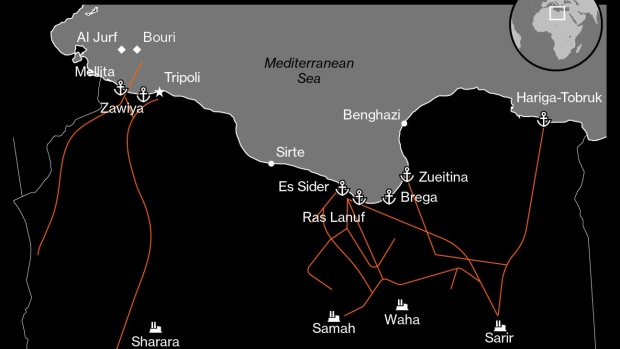Jan 24, 2021
Libya Guards to Halt Oil Shipments at Eastern Ports in Spat
, Bloomberg News

(Bloomberg) -- Members of a Libyan paramilitary force responsible for safeguarding the OPEC nation’s oil ports ordered a halt in crude shipments at two eastern terminals while they press salary demands.
Petroleum Facilities Guard members ordered the suspension of loading operations at Hariga and Ras Lanuf, according to people familiar with the situation, who asked not to be identified because they lack authorization to speak to media. The tanker Dubai Hope, currently loading crude at Ras Lanuf, would be the last to do so until the protesters’ demands are met, according to two of the people.
The halt, and the possibility that it might spread to Libya’s biggest port at Es Sider, could threaten a recovery in the Arab nation’s oil exports and production. While it might be resolved quickly, the stoppage underscored the lingering political tensions in Libya following a truce in its civil war last year.
The North African country’s output surged from almost zero to nearly 1.25 million barrels daily after a blockade of ports and fields by eastern-based forces ended in September. A tentative peace in the civil war led to the lifting of the blockade. However, the country is struggling to maintain the recovery due to the dilapidated condition of many pipelines and other facilities.
Negotiations are under way to resolve the salary dispute, according to one of the people. The protesters have also threatened to halt exports at Es Sider port. Their ultimatum for the government to pay their delayed salaries ends on Sunday, according to a letter seen by Bloomberg.
Earlier this month, the guards at Hariga temporarily refused entry to the tanker Olympic Fighter before allowing it to load. They delivered the government an ultimatum until later in January to pay what they said were overdue salaries.
The Guard was originally formed as a neutral force to defend oil ports and fields. But its members contributed to a crash in Libyan crude output at the start of last year by blockading some installations on behalf of various groups and as they sought to press their own demands.
In a separate but more positive example of the challenges it faces, Libya restarted a pipeline that carries crude to Es Sider, after a shutdown that caused the nation’s production to drop to the lowest level in two months.
The 32-inch link has been repaired and pumping has resumed, Waha Oil Co., which operates the eastern port, said in a statement. That paves the way for the return of 200,000 barrels a day that stopped flowing after Waha shut the pipeline to fix leaks.
Waha, a subsidiary of state energy firm National Oil Corp., was pumping 98,000 barrels a day on Saturday before the pipeline began operating again. It’s expected to be back to its normal daily level of 300,000 barrels within two days, according to a different person with knowledge of the situation.
(Updates with details from third paragraph.)
©2021 Bloomberg L.P.


